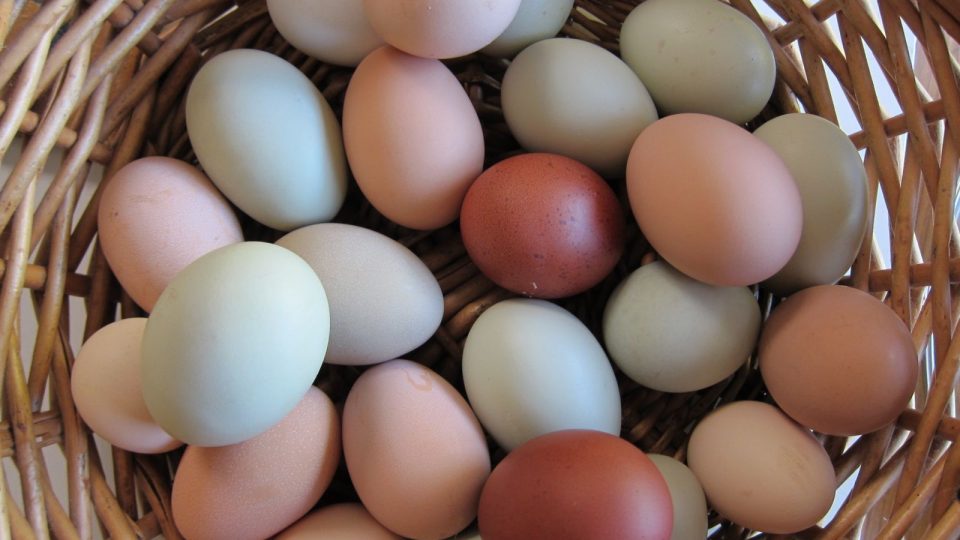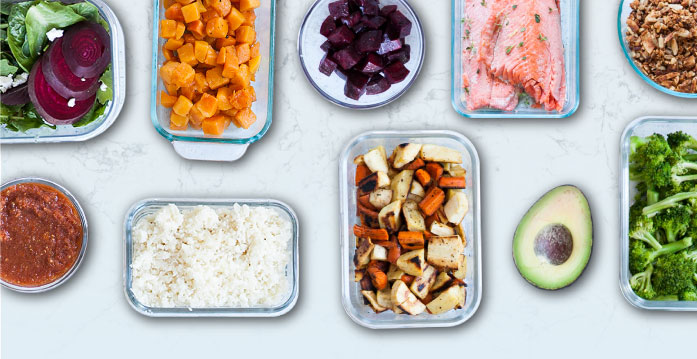Do you ever find yourself standing at the grocery store refrigerator section trying to figure out which are the best eggs to buy? Free-range, cage-free, organic, pasture-raised… What’s the difference and should you care? For that matter…
Are eggs good for you?
Eggs get a bad reputation. From the possibility of allergens (that are real for some folks!), fear of the saturated fat and cholesterol in the yolks, to truly ridiculous claims about eggs being chicken menstruation (birds do not have periods, only mammals do) the list goes on and on.
Putting the absurd aside, for those of us that are not allergic, eggs are – quite simply – a relatively affordable, nutrient-dense protein source. And despite the hype, the fat and cholesterol in eggs are essential for human health which you can read more about here.
Eggs can play an important role in a balanced, nutritious diet. That said, how chickens are fed and raised affect the nutritional value, taste, and possible health risks of the eggs and meat they produce.
Understanding labels when deciding the best eggs to buy
Poultry and egg farmers use a variety of words on their labels to describe how chickens are raised. In many cases, these are just clever marketing to make consumers feel better about their choices when deciding which are the best eggs to buy.
First, let’s get the USDA labels out of the way, which basically only tell you how fresh the eggs are (Grade B eggs for “liquid eggs” and baking which are not typically available to consumers; Grade A “very high-quality eggs”, and Grade AA “the freshest and highest quality eggs”).
We believe these are the three labels you need to pay the most attention to:
Cage-free
According to the USDA, cage-free eggs “are laid by hens that are able to roam vertically and horizontally in indoor houses, and have access to fresh food and water… [Producers] must allow hens to exhibit natural behaviors and include enrichments such as scratch areas, perches, and nests. Hens must have access to litter, protection from predators, and be able to move in a barn in a manner that promotes bird welfare.”
Free-range
The difference between cage-free and free-range is that the latter have access to the outdoors. That said, free-range hens could be outside for as little as five minutes a day or not at all and still be labeled “free-range”. These chickens will produce superior quality eggs than cage-free hens as they typically have more space to move around but not as great as pasture-raised hens.
Pasture-raised
Pasture-raised hens spend time outdoors with exposure to sunshine and the opportunity to eat grass and insects. This is the gold standard for chicken raising. The importance of chickens’ exposure to the outdoors can’t be overestimated in terms of quality and nutritional value imparted to the eggs (as well as chicken meat).
Eggs that come from pastured chickens are healthier, more nutritious, and much tastier than factory farm products. Egg whites are thicker, yolks are bigger, darker, and appear orange rather than pale yellow.
All this said, while it’s ideal to choose eggs from pasture-raised hens whenever possible, it’s important to emphasize that “pasture-raised” is not a USDA-regulated term. Therefore, you need to do your own research to make sure your egg farmers’ marketing claims are legit.
More terms to help you understand egg labels
As explained by the Animal Legal Defense Fund, egg terms can be confusing and misleading. Things like “Farm Fresh”, “Naturally Raised”, “Animal Friendly”, “Happy Hens”, and even “Pasture-Raised” can just be slapped on any website or label without just cause.
Here are some more keywords worth explaining to help you decide which are the best eggs to buy…
Certified organic eggs are guaranteed to have been fed only organic feed with no parameters on how the animals are raised or treated. Ideally, your eggs will be organic AND pasture-raised. Keep in mind that, oftentimes local farmers feed pasture-raised poultry antibiotic-free, organic feed, but they’re unable to be certified as organic – one more reason to get to know your farmer!
Vegetarian hens are given a strictly vegetarian diet. However, chickens are omnivores and in their natural habitats (pecking around outdoors) they consume animal protein in the form of insects, so this may or may not be important to you.
Fertile eggs indicate a chicken is probably free-range and potentially has access to interactions with a rooster. Some believe fertile hens have a higher quality of life than caged chickens. And if you’re worried about encountering an embryo, it’s not likely since eggs are usually collected and refrigerated within a day of laying.
Omega-3 eggs are produced by hens that are specially fed a diet (usually including flax meal) that is rich in omega-3 fatty acids. These eggs have 3 to 6 times the amount of omega-3 fatty acids found in other eggs, however, they are not free-range or pasture-raised unless also stated.
Brown vs. white (or green or speckled!) – The color of eggs does not reflect quality or nutritional value – only the breed of hens laying them. What’s more telling is the color of the yolk: The more deep orange the yolk is, usually the better quality and the fresher the eggs.
Humanely raised – There are numerous egg producers who voluntarily participate in private certification programs. According to the experts, the label Animal Welfare Approved “sets the highest standard for the treatment of hens used by the egg industry.”
The Global Animal Partnership (GAP) is a private certifying agency commonly used by companies like Whole Foods and Niman Ranch to create and uphold standards for more humane and healthy meat, poultry, and egg production. At the time of this writing, their laying hen program seems relatively new without many partners, however as organizations like this become more prevalent, we look forward to the peace of mind their efforts could bring to conscious consumers like us.
Are better eggs worth the cost?
In summary, the best way to know the quality of your eggs is to know where your eggs come from and to ask questions about how they are raised and what they are fed. Beyond that, organic AND pasture-raised (or at minimum free-range) are best.
Though more expensive and sometimes confusing to find, the nutrition upgrade is certainly worth the price when it comes to eggs. Eggs are far cheaper than pasture-raised chicken or beef, and for vegetarians, eggs provide essential nutrition. Even the most expensive eggs can stretch a long way if you cook them up with lots of veggies or stir them into a fried rice dish.
Some of RealPlanners’ favorite egg recipes
Now that we’ve hopefully cleared up the confusion on deciding which are the best eggs to buy, let’s grab a dozen, scramble, fry, and get some egg dishes on your meal plan! Here are some of our faves:
Creamed Spinach with Barley and Baked Eggs
Sweet Corn and Zucchini Quiche



